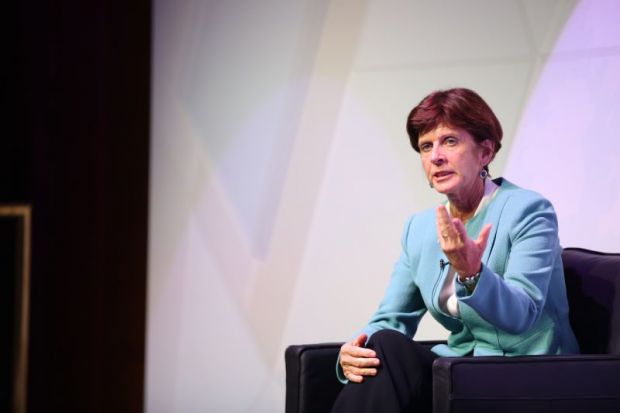The Westminster government’s campus free speech reforms are a “disturbing” interference in the democratic mission of universities, according to a former vice-chancellor of the University of Oxford.
Dame Louise Richardson also claimed that ministers only wanted to protect freedom of speech that they agreed with, in a lecture given at King’s College London.
The intervention came after the passing of the Higher Education (Freedom of Speech) Act in May and the appointment of Arif Ahmed, professor of philosophy at the University of Cambridge, as director for freedom of speech and academic freedom at the English sector regulator, the Office for Students.
Campus resource: A DIY guide to protecting academic freedom
In her lecture, Dame Louise said that she was “disturbed by the attempts in recent years of the UK government to interfere in the democratic mission of universities by imposing a ‘free speech tsar’”.
“This interference smacks at best of mistrust and at worst of a power play,” she said. “I believe that existing university regulations were perfectly sufficient and equal to the task of making good decisions regarding invited speakers.”
Dame Louise highlighted that the government’s own Prevent legislation “restrict[ed] speech antithetical to British values” on campuses and referenced reports that potential speakers in government departments would be disinvited if they were found to have criticised ministers.
“I fear the UK government’s commitment to freedom of speech – and they are not alone in this – is limited to freedom of speech with which they agree…Politicians who will not hear a range of critical views from experts delivered in Westminster have no right to talk down to universities about free speech,” said Dame Louise, who left Oxford at the end of last year and is now president of the Carnegie Corporation of New York.
In her speech, Dame Louise characterised universities as being “like rainforests in an overheated political landscape”, able to clear the air of toxicity to help fight democratic decline.
Universities are “key nurturers and preservers of democracy” already because studying is proven to increase participation in voting, as well as boosting support for social inclusivity, she said.
“When we make the benefits of a university education as widely available as possible – through increased accessibility, digital outreach, part-time study options and so on – we shrink the diploma divide, which seems such a potent source of mistrust and polarisation,” Dame Louise said.
“It is also very likely that we will be expanding the views of all those who have studied with us. That expansion includes equipping people to understand political ideas and systems and to participate better in democracy at a local and a national level – whatever their political sympathies – with greater access to a wider range of ideas.”
Dame Louise said that universities “need consciously to foster tolerance and encourage participation” by training students to see issues from multiple perspectives.
But, she continued, debate on current affairs should not be confined to what she termed the “union”, referring to spaces such as the Oxford Union, “a space often dominated by political hacks in training, who prefer to argue on the binary Westminster model of attack and defence and may well have learned a bombastic speaking style at school that plays to the pit”.
“We need to be nimbler at creating more welcoming, less gladiatorial spaces and better constructive models for debate, where there is room for more shades of opinion, more diverse faces and voices to be seen and heard,” Dame Louise said.
“Universities can also consciously, in their learning practices, help students gain experience of thinking together, collaboratively as well as individually – with emphasis placed in the teaching process and graded work on such teamwork.
“Students benefit from learning how to negotiate, how to make concessions, how to change their minds and enjoy doing so, how to find a workable solution to a problem where many different actors have different priorities. Not merely scoring points, but building consensus.
“Students who have this experience in university will surely translate it into political participation post-university and arrest the escalating rise in youth disillusionment with politics.”
Dame Louise also suggested that universities could help tackle misinformation and conspiracy theories by filling the “gap in digital newsstands” by communicating their research directly and more effectively, cutting out media organisations in the middle.
“Universities have been in the habit of using their communications teams largely to disseminate information about their own achievements – prizes won, goals met, new buildings opened. Nothing wrong with that, of course. But what if we regarded our media potential differently and became, instead of self-advertisers, trusted advisers, whom readers turned to for their weekly information?” Dame Louise asked.
“Without a party-political agenda, audience figures to keep up, or trustees who are so liable to muzzle us, we can become staunch bastions of truth, holding the eroding line of balance and accountability, preventing the flood of misinformation from overwhelming the digital commons.”
Register to continue
Why register?
- Registration is free and only takes a moment
- Once registered, you can read 3 articles a month
- Sign up for our newsletter
Subscribe
Or subscribe for unlimited access to:
- Unlimited access to news, views, insights & reviews
- Digital editions
- Digital access to THE’s university and college rankings analysis
Already registered or a current subscriber? Login








